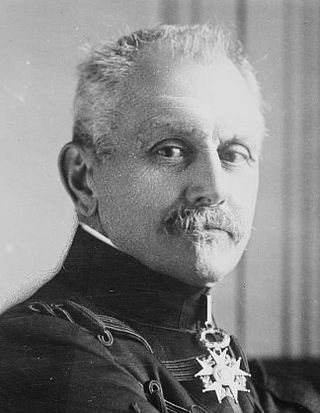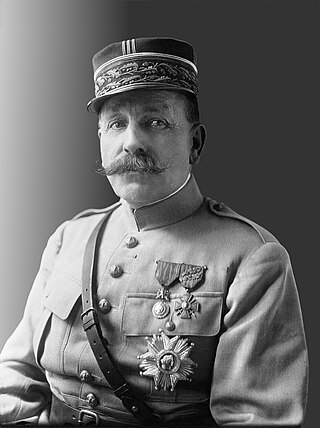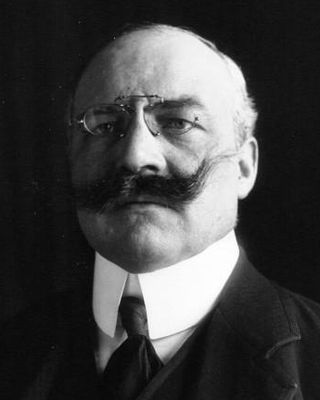
The First Battle of the Marne or known in France as the Miracle on the Marne was a battle of the First World War fought from 5 to 12 September 1914. The German army invaded France with a plan for winning the war in 40 days by occupying Paris and destroying the French and British armies (Allies/Entente). The Germans had initial successes in August. They were victorious in the Battles of Mons and the Frontiers and overran a large area of northern France and Belgium. In what is called the Great Retreat the Germans pursued the retreating Franco/British forces more than 250 km (160 mi) southward. The French and British halted their retreat in the Marne River valley while the Germans advanced to 40 km (25 mi) from Paris.

Joseph Jacques Césaire Joffre, was a French general who served as Commander-in-Chief of French forces on the Western Front from the start of World War I until the end of 1916. He is best known for regrouping the retreating allied armies to defeat the Germans at the strategically decisive First Battle of the Marne in September 1914.

The Battle of the Ardennes took place during the First World War fought on the frontiers of France, Germany, Belgium and Luxembourg from 21 to 23 August 1914. The German armies defeated the French and forced their retreat. The battle was part of the larger Battle of the Frontiers, the first battle of the Western Front.

Ferdinand Foch was a French general, Marshal of France and member of the Académie Française. He distinguished himself as Supreme Allied Commander on the Western Front during the First World War in 1918.

Plan XVII was the name of a "scheme of mobilisation and concentration" which the French Conseil Supérieur de la Guerre developed from 1912 to 1914, to be put into effect by the French Army in the event of war between France and Germany. The plan was for the mobilisation, concentration and deployment of the French armies to make possible an invasion either of Germany or of (neutral) Belgium or of both, before Germany completed the mobilisation of its reserves simultaneous with an expected Russian offensive.

Joseph Simon Gallieni was a French military officer, active for most of his career as a military commander and administrator in the French colonies where he wrote several books on colonial affairs.

Robert Georges Nivelle was a French artillery general officer who served in the Boxer Rebellion and the First World War. In May 1916, he succeeded Philippe Pétain as commander of the French Second Army in the Battle of Verdun, leading counter-offensives that rolled back the German forces in late 1916. During these actions he and General Charles Mangin were accused of wasting French lives. He gives his name to the Nivelle Offensive.

The Battle of the Frontiers comprised battles fought along the eastern frontier of France and in southern Belgium, shortly after the outbreak of the First World War. The battles resolved the military strategies of the French Chief of Staff General Joseph Joffre with Plan XVII and an offensive adaptation of the German Aufmarsch II deployment plan by Helmuth von Moltke the Younger. The German concentration on the right (northern) flank, was to wheel through Belgium and attack the French in the rear.

Noël Édouard, vicomte de Curières de Castelnau was a French military officer and Chief of Staff of the French Armed Forces during the First World War. Elected deputy in 1919 and president of the Army Commission in the legislature, he then took the head of a confessional political movement, the Fédération Nationale Catholique. During the Second World War, he opposed Marshal Pétain and the Vichy regime and supported the French Resistance. For a long time controversial because of a Catholicism that was considered outrageous by his opponents, historians have moderated that portrait by emphasising his great loyalty to republican institutions and disputed in particular that he could have been reactionary or anti-Semitic.

The Battle of Mulhouse, also called the Battle of Alsace, which began on 7 August 1914, was the opening attack of the First World War by the French Army against the German Empire. The battle was part of a French attempt to recover the province of Alsace, which France had ceded to the new empire following its defeat in the Franco-Prussian War of 1870–1871. The French occupied Mulhouse on 8 August and were then forced out by German counter-attacks on 10 August. The French retired to Belfort, where General Louis Bonneau, the VII Corps commander, was sacked, along with the commander of the 8th Cavalry Division. Events further north led to the German XIV and XV corps being moved away from Belfort and a second French offensive by the French VII Corps, reinforced and renamed the French Army of Alsace, began on 14 August.

Michel-Joseph Maunoury was a commander of the French forces in the early days of World War I who was posthumously elevated to the dignity of Marshal of France.

The Battle of Lorraine was a battle on the Western Front during the First World War. The armies of France and Germany had completed their mobilisation, the French with Plan XVII, to conduct an offensive through Lorraine and Alsace into Germany and the Germans with Aufmarsch II West, for an offensive in the north through Luxembourg and Belgium into France, supplemented with attacks in the south to prevent the French from transferring troops to the greater threat in the north.

Maurice Paul Emmanuel Sarrail was a French general of the First World War. Sarrail's openly socialist political connections made him a rarity amongst the Catholics, conservatives and monarchists who dominated the French Army officer corps under the Third Republic before the war, and were the main reason why he was appointed to command at Salonika.

Augustin Yvon Edmond Dubail was a French Army general. He commanded the First Army and Army Group East during World War I.

During World War I, France was one of the Triple Entente powers allied against the Central Powers. Although fighting occurred worldwide, the bulk of the French Army's operations occurred in Belgium, Luxembourg, France and Alsace-Lorraine along what came to be known as the Western Front, which consisted mainly of trench warfare. Specific operational, tactical, and strategic decisions by the high command on both sides of the conflict led to shifts in organizational capacity, as the French Army tried to respond to day-to-day fighting and long-term strategic and operational agendas. In particular, many problems caused the French high command to re-evaluate standard procedures, revise its command structures, re-equip the army, and to develop different tactical approaches

The Battle of Grand Couronné from 4 to 13 September 1914, took place in France after the Battle of the Frontiers, at the beginning of the First World War. After the German victories of Sarrebourg and Morhange, pursuit by the German 6th Army and the 7th Army, took four days to regain contact with the French and attack to break through French defences on the Moselle.

Adolphe Marie Messimy was a French politician and general. He served as Minister of War in 1911–12 and then again for a few months during the outbreak of and first three weeks of the First World War. Having begun his career as an army officer, he returned to the Army and successfully commanded a brigade at the Battle of the Somme, and later a division. Defeated for re-election to the Chamber of Deputies in 1919, he served as an influential senator from 1923 until his death in 1935.

The Grand Quartier Général was the general headquarters of the French Army during the First World War. It served as the wartime equivalent of the Conseil supérieur de la guerre and had extensive powers within an area defined by the French parliament. The GQG was activated by parliament on 2 August 1914, after the violation of French borders by German military patrols, and remained in existence until 20 October 1919.

The First Battle of Picardy(22–26 September 1914) took place during the Race to the Sea (17 September – 19 October) and the First Battle of the Aisne (13–28 September). The "race" was a Franco-British counter-offensive, which followed the Battle of the Frontiers and the German advance into France during the Great Retreat, which ended at the First Battle of the Marne (5–12 September). The term describes reciprocal attempts by the Franco-British and German armies to envelop the northern flank of the opposing army, through Picardy, Artois and Flanders.

Général Victor-Constant Michel was a French General officer. He led the French Army in 1911, but following his opposition to the French strategy for war with Germany was replaced by General Joseph Joffre in July 1911. In August 1914, he was the Military Governor of Paris, but was replaced later that month by General Joseph Gallieni.




















